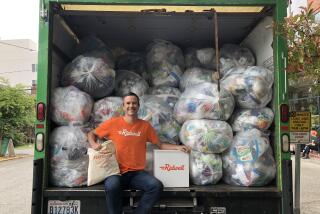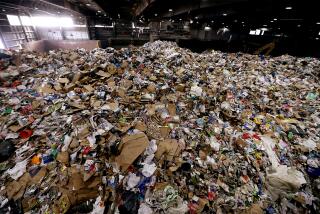Papered Over : Ventura-based Kinko’s is among copying firms that are increasingly offering recycled stock.
- Share via
Ventura is national headquarters of the 600-unit chain of Kinko’s instant printing and copy centers. They offer many choices of papers for people to have their menus, newsletters, screenplays and resumes duplicated.
I asked them just the question one would expect to get from an environmental columnist: “Do you print on recycled paper?”
Adrianna Foss, vice president of operations for the chain replied, “Since Earth Day 1990, we’ve made it mandatory for all our stores to provide recycled stock on customer request.” Some of their stores, she said, offer only recycled stock. Of course, “recycled stock” doesn’t always mean that it’s made from 100% used fibers. Virgin wood fiber also is used in most paper today marked “recycled.” Customers must check the package to see what the percentage is--like checking the karat count on gold.
But Foss went on to say that today marks the beginning of a new program at Kinko’s, which she was only too happy to tell me about. Kinko’s shops nationwide will begin offering customers paper made from 100% recycled material.
This means no trees were cut down to make this paper. It’s made from stuff you and I put out on the curb or that the paper mill trimmed off the edges of the roll and put back into the pulp grinder.
But the point of this column is to encourage you to ask for recycled paper whenever you patronize a copy store or buy copy paper at an office supply store.
It used to be that paper with recycled content was hard to find or more expensive. But those days are past. Retailers such as Office Depot in Oxnard sell reams of recycled copy paper for $2.88. The stuff made only from virgin pulp costs 10 cents more.
The American Paper Institute, the national trade group, says that because of consumers’ recycling efforts, about a third of the fiber used to make paper and boxes in America is being diverted from landfills.
“We want to keep 40% from being landfilled by ‘95,” said J.R. Edwards, vice president of the institute.
Kinko’s is not the only copy business offering a high grade of recycled paper. It just happens to have its national headquarters in our county.
Across the county line in Agoura Hills, PIP, the biggest in the business with more than 1,000 stores, has been exhorting its franchises nationwide to offer this choice. PIP doesn’t own these shops but has been able to get its people to get on the recycling bandwagon.
Nancy Soloman, who owns the PIP shop in Camarillo, said: “We always suggested recycled, and certain people are amazed that we can come up with recycled stock.”
Others simply don’t “give a hoot” about recycled. But many decide to have their printing done with the “printed on recycled” mark prominently displayed as a “badge to enhance their company’s image,” as Soloman put it.
She, as owner of the shop, is in position to order any grade or percentage of recycled paper the customers want.
In case you’re wondering whether we at The Times are living in a glass house and throwing stones, let me say that half the paper fiber in this edition has been diverted from the landfill.
The paper institute told me that, in Los Angeles County, 60% of the newspapers printed each day get recycled somehow.
They also said the Port of Los Angeles ships more than a million tons of scrap paper a year to the Orient to be made into cartons.
Closer to home, 50 new facilities for using scrap paper have appeared in America in the last few years.
“Paper recycling extends our forest resources,” Edwards said, reminding me that there will always be a certain amount of paper made from wood pulp no matter how fanatically we recycle.
“You can only use scrap so many times before the fibers get so short you have to add wood pulp.”
Ironically, America throws more paper away than it produces. That’s because we import a lot of paper in the form of packaging.
But we still can serve our environment just by requesting recycled paper when we’re copying something. Kinko’s management is exploring a way to make this easier. I hope all the copy stores in the nation pick up on this idea.
They may soon be loading all their self-service copy machines with recycled paper only--so it will be effortless for us to be environmentally virtuous.
More to Read
Inside the business of entertainment
The Wide Shot brings you news, analysis and insights on everything from streaming wars to production — and what it all means for the future.
You may occasionally receive promotional content from the Los Angeles Times.










